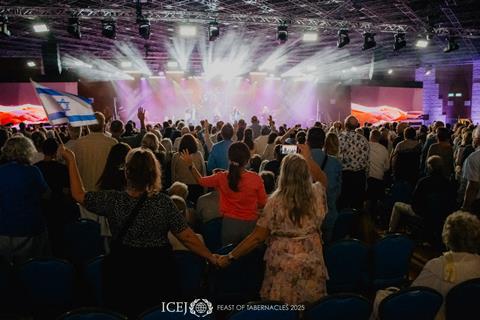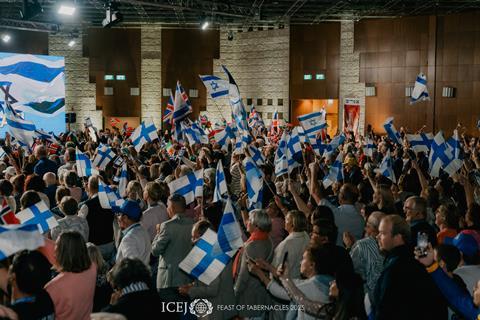Pastor Regan King was visiting Israel for a large Christian conference when it emerged the Israeli hostages were to be released and the war in Gaza was over. He explains what the atmosphere was like, and why over 1500 evangelicals making a pilgrimage from 70 nations to be in Jerusalem could be a fulfilment of an Old Testament prophecy

This year’s gathering of Christians for the Feast of Tabernacles in Jerusalem, organised by the International Christian Embassy Jerusalem (ICEJ), carried a weight that transcended mere celebration.
ICEJ has long served as a witness to Christian care, love, and support for Israel. It represents millions of evangelical believers around the world and reaches with breadth and depth into Jewish and Arab communities alike.
I pastor The Angel Church in London, which counts among its congregation individuals directly impacted by the conflict in Israel and Gaza over the past two years. I myself am husband to an Israeli Jewish believing wife who has family and friends still in Israel, so the past two years have taken a heavy personal toll.
Earlier this month we joined 1510 other Christians from over 70 different nations in travelling to Israel for the Feast of Tabernacles, where I was working as a chaplain to ICEJ’s 85-strong volunteer team who were putting the event on.
As the conference was beginning, news broke that the remaining 50 hostages held by Hamas in Gaza since 7 October 2023 would potentially be released.
I will never forget the moment I heard the news. I’d been greeted in the hostel lobby by an Israeli man and his children. He had seen my event lanyard and wanted to thank me for our presence and actions of care for the land. He was sincere and heartfelt in his unexpected effusion of gratitude. Then he spoke the words that stopped my heart: “Have you heard the news? The war is over. The hostages are coming home.”
While some could argue my friend’s statement was somewhat premature, it was nevertheless difficult to restrain immediate emotions of joy over the long prayed for return of the hostages and end to the devastating conflict in Gaza. My plan for our group devotion changed that morning as I relayed the news and we took comfort in the words of Isaiah 40 and its proclamation of God’s might, majesty, and mercy. The drip-feed of information and real-time developments over the rest of the week brought a tangible air of anticipation, excitement and gratitude to God for answered prayer as a ceasefire deal was confirmed.
The Feast of Tabernacles - or Sukkot - is an annual biblical harvest feast which has been observed since the time of the wilderness wanderings in which Jews set up “booths” or “tabernacles” to eat and live in for eight days in remembrance and celebration of God’s provision of shelter and sustenance during the Exodus from Egypt. It is also the Feast at which Jesus declared himself to be the water of life (John 7) - a clear allusion to the the Old Testament offering of water and wine on the altar of the Lord and the words of Isaiah 12:3 read every day of Sukkot where God’s people are promised to drink from the wells of salvation.
It is in the immediate aftermath of the same Feast that Jesus declares himself as the light of the world (John 8), standing in the area of the Temple where massive candelabra were erected to radiate light across the city every Sukkot.

It is also the Feast which is prophesied will be observed in the future New Jerusalem (Zechariah 14). There’s an intriguing prophecy in this same book, which says, “In those days ten people from all languages and nations will take firm hold of one Jew by the hem of his robe and say, ‘Let us go with you, because we have heard that God is with you.’” (8:23) It’s from this verse that ICEJ developed the conference theme “Ten from Every Nation” and made clear it’s ambition: to bring Christians from all nations into Jerusalem to worship Jesus during the Feast of Tabernacles, and testify that Israel does not stand alone in this fraught season. We believe God will continue to bring about his perfect plan and purpose, promised throughout scripture for the Jewish people.
ICEJ’s Feast festivities opened near the Gaza border with a time of worship and a solidarity ceremony on 6 October at Sapir College in the western Negev. Two years ago, Ofir Libstein, head of the Sha’ar HaNegev Regional Council from 2018 to 2023 addressed Feast delegates at the same spot. Two days later he was killed at Kibbutz Kfar Aza by Hamas terrorists. Now, two years later, Ofir’s brother spoke with attendees and received funds raised to set up community centres for recovery from trauma in the same area. Such investment in meeting Israel’s immense spiritual and practical needs has marked ICEJ’s ministry with its reach impacting everyone from impoverished Holocaust survivors to leading political figures.
A special service was also held at the Garden Tomb, which happened to take place the day before the ceasefire deal was confirmed. Malcolm Hedding delivered a powerful message on Christ’s substitutionary atonement and the time was led by an Arab Christian and Jewish believer together — a vivid illustration of Paul’s declaration of the “one new man” in Messiah (Ephesians 2:15). Where the world only looks for and sees division, this was a powerful reminder of reconciliation possible through the gospel.
As Israel comes out of the fog of the past two years of conflict and the shock of what Hamas carried out on 7 October 2023, I have every confidence that ICEJ will continue to be a light in the darkness and a primary catalyst of transformation and renewal through which even more than ten people from every nation will take hold of the one Jew, Jesus who tabernacled with us so that we might know his light and drink from his well of salvation.


































No comments yet